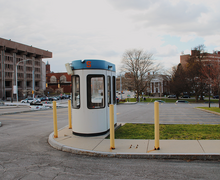SU to test wastewater in campus facilities for traces of coronavirus
Emily Steinberger | Photo Editor
The Syracuse Surge is an economic and growth initiative that aims to revitalize Syracuse through technology.
The Daily Orange is a nonprofit newsroom that receives no funding from Syracuse University. Consider donating today to support our mission.
Syracuse University will test wastewater from 24 points around campus this fall for traces of the coronavirus.
Traces of the virus can be detected in wastewater up to 10 days before an individual shows symptoms. SU announced the implementation of a wastewater surveillance program over the summer as one of the ways it would monitor the spread of COVID-19 on campus with the return of residential learning this fall.
SU will test the wastewater of all SU residence halls and four off-campus neighborhoods. The goal of the program is to identify potential clusters of the virus on campus before it can spread, said David Larsen, associate professor of public health at SU’s Falk College.
“(Wastewater testing) fits into a goal to have some confidence that the dormitory is absent of coronavirus transmission,” said Larsen, who served on SU’s Public Health and Emergency Management Subcommittee, which advised administrators about the health implications of reopening. “The dormitory environment really facilitates airborne illness transmission like the coronavirus.”
It’s unclear whether the wastewater surveillance program has uncovered any traces of the virus. As of Wednesday, SU had confirmed nine active COVID-19 cases among students in central New York.
Students aren’t allowed to access residence halls other than their own because of the wastewater surveillance program. If the university finds traces of the virus in a dorm’s wastewater, all residents of the building will be tested using pooled saliva testing, Larsen said. The university will test wastewater samples twice each week.
Onondaga County has also set up several wastewater surveillance points as part of a state-funded pilot program. SU partnered with the county to include four popular off-campus student housing locations, including the Westcott neighborhood and The Marshall apartment complex, Larsen said.
“If we do see (cases) increase, we’d consider setting up some test sites there,” he said. “The idea of wastewater stuff is that it kind of directs you where to test students.”
The university is awaiting permits so it can access results from off-campus testing points, Larsen said.
SU previously indicated that the surveillance program would also include some academic buildings. Because it would be difficult to monitor who enters each building, the university has opted not to include them in the program, Larsen said.
It’s unclear which facilities aside from SU’s residence halls are included in the program. University officials have previously mentioned that athletic facilities may also be subject to wastewater surveillance.
Wastewater testing is only part of SU’s COVID-19 testing apparatus for the fall semester. The university required students to submit a negative test result prior to arriving on campus and tested all students upon arrival. Students will receive another round of pooled saliva testing next week, after which SU will rely on the surveillance program and random testing to monitor for the spread of COVID-19 on campus.
The surveillance program will not be able to pinpoint any positive cases of the virus on its own, said Brooks Gump, Falk family endowed professor of public health. But it will allow the university to track where the virus is present on campus so SU can focus its testing efforts.
“What a wastewater (program) does is it tests the whole system, the whole location,” Gump said. “It’s a nice quick assessment of a group of people which you can use to determine if you need to follow up or not.”
Published on September 2, 2020 at 11:37 pm
Contact Mira: mlberenb@syr.edu






